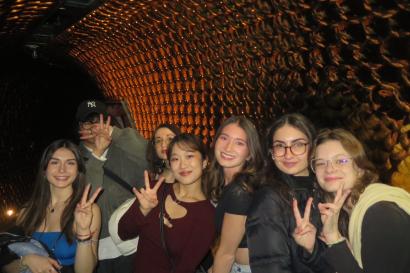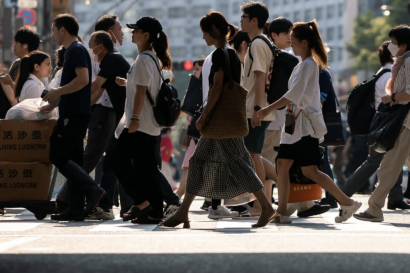Being sick is the worst. I thought being sick in college was the worst, but I did not account for the fact that I would get sick abroad. Sure, I brought my American drugs: Tums, Nyquil/Dayquil combo, Tylenol, and Advil. I have a whole pharmacy in my closet, but hearing about how clean Japan was, along with the fact that I was doing so well a whole month and a half into traveling with all the crazy things I've been exposing myself to (new environment, traveling, food, people, etc.), I thought I would come out scot-free. Considering I usually get sick two weeks into starting school again, a month is a long time, especially considering travel. I even commented on my supposed strong immune system to a friend a week ago, saying, "I'm just surprised I haven't gotten sick" when all of my friends were sick at the time. Turns out I did not skip the sickness—it just hit me a week late. And on Halloween. Ugh.
Regardless, I began feeling off a couple of days before it really got bad. However, I had had an itchy throat a couple of weeks ago that resolved itself the next day, and I suspected it was the same deal. Besides, I was in the middle of an IES Abroad trip—I was going to finish that before I began worrying about my health. (Thank goodness I did—Shirakawa-Go and Takayama were breathtaking). When it did not clear up, I took a shot of Dayquil and decided to push through the school day, feeling fatigued with a sore throat.
It's especially hard being sick in as strict of an environment as the Intensive Japanese course at Nanzan. In order to have an excused absence, you need to get a doctor's note, so if you are feeling under the weather but not terrible enough to warrant a doctor's visit, you go to class. What a stark difference from my school, where if I am feeling especially fatigued, I just send an email to my professor saying I'm not feeling well, and my professor replies saying they hope I feel better and they'll see me in the next class. Not here.
However, pushing myself on Monday led to me coming home and immediately collapsing in bed, feeling feverish for the rest of the evening and night. I messaged my host mom, who almost made me cry with how caring and sweet she was. She rushed up and down the stairs getting me water and a thermometer, trying to understand my broken Japanese, made even worse by my brain fog. No fever, but my terrible state warranted a doctor's visit.
Now I'll get into stuff somebody should know if doing the IES Abroad Nagoya (or any Japan) program. In Japan, there are these things called clinics (which as an American, is a foreign concept, perhaps students from other places in the world have something similar). They are family-run and usually neighbors with a pharmacy so you can just pop on over and get your meds. You will need your insurance card, and, at least in my experience, that's it. It is extremely easy, especially if you live in as small a town as Nisshin like me.
If you are in a homestay, your family/host mother should be more than happy to take you to the clinic or at least provide you with information on where it is. I am so lucky my host mom came along and translated all the documents for me. It wouldn't have been impossible if she wasn't there, so if you are Level 2 Japanese or above, you should be okay with translating and asking the (very nice) staff clarifying questions, but it definitely made the process smoother. If you are in a dorm, I'd recommend bringing along a Japanese friend or somebody in a higher Japanese-level class to help you if you truly feel nervous about it.
You walk into the clinic, where the receptionists will ask you about your symptoms, so definitely know the Japanese words for fever, cough, and runny nose as these are all COVID symptoms. You will hand them your insurance card, and they will hand you a clipboard with documents, just like in the US. Then you will go into a room with the doctor, sensei, who is most likely the only doctor in that clinic as it's family-run. Mine was a very nice man who actually knew English from studying abroad thirty years ago (I don't think I'd be able to remember a word in Japanese thirty years from now), so perhaps your doctor, especially if you go to a clinic in Nagoya (like the one close to Irinaka), will speak some English. The doctor will ask you about your symptoms again, do the tests needed, and then will explain what you need to do (taking meds, resting, isolating, etc).
In my experience, I told him about my swollen lymph nodes, and he looked inside my throat and noted it was red. He did a blood test (prick of the finger only) and explained that my white cell blood count was high, meaning it was a bacterial infection. AKA strep throat. Blegh. A contagious disease on Halloween? In Japan? It couldn't have come at a worse time, but in the end I wasn't even feeling worried as I just wanted to be cured and rest.
Before leaving, I requested a written excuse note to provide to my Japanese teachers. Do not forget this step. Especially if you are planning to skip a couple of days in the future and want to hoard these days until you really need them *wink wink*. I paid whatever I had to (it amounted to around 3,500 yen, which is almost exactly my copay in the US for when I went to urgent care), and walked out. My host mom walked me to the pharmacy nearby, where I was prescribed a handful of different pills (the main being amoxicillin, the rest I ditched after a day of taking them as the descriptions when I looked them up on Google disturbed me. Why was I taking a medicine made for gastrointestinal issues?). I paid for the pills, another 20 or so dollars, with the total being perhaps around 50. I was so tired I didn't keep track of money, and I wasn't about to argue with the doctor or pharmacist about what I needed and what I didn't.
After taking my first antibiotic around lunch, I began feeling 80% better by night. The next day as I write this, I am feeling completely healed of strep, but am now battling congestion and a small cough. Now is the season to wear masks on public transport, so I will be contributing to this well-known Japanese cultural phenomenon as I do not plan on getting sick again anytime soon. I lament not being able to celebrate Halloween, but if you join certain clubs at Nanzan, they throw amazing Halloween parties! I had the privilege of going to one, so I at least wore my costume once.
The process is easy (with some help) and everybody is so kind, you will certainly feel supported through whatever sickness you have, and you won't break the bank doing it (depending on what you have, of course). Always plan on getting sick somewhere new and bring your mini pharmacy of drugs you know and can read. Tums and Advil are my best friends, and they will get you through your study abroad semester. Stay safe!
P.S.
Something interesting I learned from my host mom is that Japanese people hardly consider strep throat to be serious at all. She asked me if I wanted to go out, and when I said yes (completely thinking hypothetically—I didn't actually consider going out) she said I should go. I said that, at least in America, I can't leave the house for 24 hours, and she said in Japan, as long as you don't have a fever, you're allowed to go out, which was such a foreign concept to me. They did not even ask me to wear a mask around the house until I wasn't contagious and were surprised when I told them the procedure in America was to stay home, change your toothbrush, and wash everything your lips touched to not get infected again. I am not going to use my host family as the only example of Japanese people's thinking, but it is an interesting look into what different cultures consider "sick" and what is clean versus what isn't. A Japanese friend of mine, who admitted he had strep, even went out to the club on Halloween. An interesting dichotomy to think about for sure.

Isabella Madruga
I am a senior at Johns Hopkins University studying Writing Seminars (a fancy way of saying creative writing) and Sociology. My main goal in life is to be an author, so when I'm not scrolling on TikTok, I'm writing stories, reading, and daydreaming.





